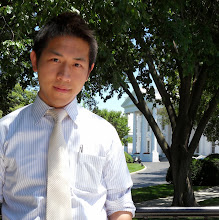-------
Why I'm scared of strawberries from Greenland
by Ching-Yi Chang (Sept. 20, 2007)

There are now potato plantations in Greenland.
"It is foreseen that Greenland can grow strawberries soon," the Greenland prime minister recently said. "It is a good thing for Greenland."
However, not much else is good about it. The Greenland ice sheet has rapidly shrunk as the average Arctic temperature increased to twice the global average in the past 100 years.
The opposite end of the Earth is no better. The Antarctic Ocean is too full to absorb carbon dioxide - our largest carbon trap is packed. And since carbon dioxide is the major anthropogenic greenhouse gas, if we can't reduce carbon dioxide emissions, our world will become warmer. Warmer isn't better for frigid countries like Greenland, not to mention coastal and crowded cities like New York that are vulnerable to rising sea levels.
Over the past century, the Earth's mean temperature has risen 1.35 degrees Fahrenheit. By the end of this century, the mean temperature will soar upward by as much as 9 degrees, according to a 2007 study by the Intergovernmental Panel on Climate Change, composed of about 2,000 scientists.
Much of the foreseeable chaos cannot be gauged with a thermometer. Environmental disasters make food and water scarce, and the ensuing migration of people could engender the outbreak of disease and war. Some call the Darfur tragedy the first climate change war because of its origins in decades of drought.
It is no wonder, then, that the U.N. Security Council recently recognized climate change as not only an environmental issue, but as a threat to global security. The French even called it "the number one threat to mankind."
In Midtown, world leaders from nongovernmental organizations and the public and private sectors convened at the U.N. headquarters to voice their concerns about climate change.
The conference's declaration will be an important reference for this December's U.N. conference on climate change in Bali, Indonesia. A new global climate change agreement is needed by 2009 to replace the Kyoto Protocol before it expires in 2012.
Among the 2,500 participants, 400 were students - 72 of whom were student journalists from five continents. They will inform student communities worldwide that climate change is the toughest issue our generation must confront; our generation will experience firsthand the effects of climate change, after all.
Climate change is not only a challenge to our very existence, but a challenge to our future. We can move to any city to pursue our dreams, but we can't leave the Earth.
In 1932, The New York Times warned us in a headline, "Next Great Deluge Forecast by Science: Melting Polar Ice Caps to Raise the Level of Seas and Flood the Continents."
But before 1968, no government paid attention to the issue of climate change. It wasn't until 2005 that the Kyoto Protocol finally took effect. However, the U.S. - responsible for 25 percent of global greenhouse gas emissions - is still not one of the 160 signing countries.
How long has it taken most countries to decide to tackle the issue of climate change? 73 years.
Yet it remains unclear whether or not the Kyoto Protocol will be decidedly effective in changing the course of global warming without U.S. participation.
We cannot afford to wait for today's leaders to determine our future. Act today. Act now. The world is in our hands.
The United Nations may have the will, the countries may have the technology, the entrepreneurs may have economies to deal with the current situation. But all we need is one important person to change the world: You.
One issue had a constant presence at the conference: Together we can make a difference. Everyone's individual effort can make a huge difference. After all, we have prevented ozone depletion.
So what to do now? Easy: Plant trees and change your lifestyle. Pay $57 to plant 11 trees and maintain them for 70 years - that will help you offset your personal carbon dioxide emissions. If you drive, plant more.
You know more than you may think about preventing climate change: Drive less, recycle, use low energy light bulbs and act globally but shop locally. A head of lettuce from California that traveled 3,000 miles to New York consumes 40 times its caloric value to produce and ship.
Some critics improperly dismiss climate change as a conspiracy for developed countries to suffocate developing countries' growth, that all the talk about climate change is just brainwashing, that we can't prevent it anyway.
In any case, for your health, your wallet and your future, do something if you can.
For our future, let's act together now.
